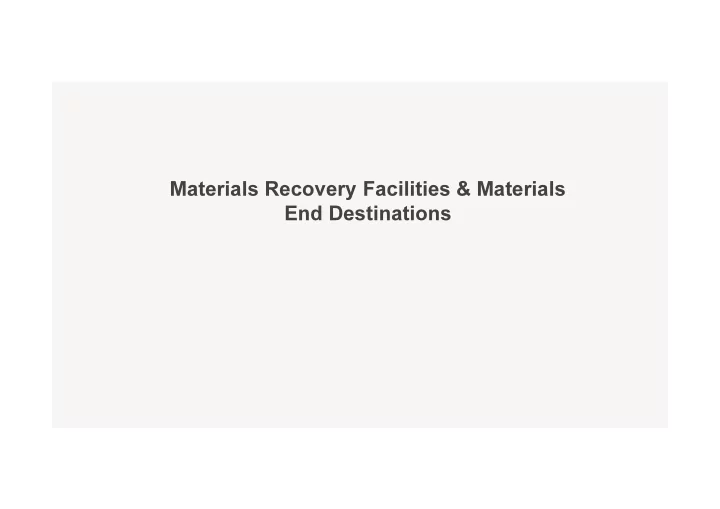

Materials Recovery Facilities & Materials End Destinations
Hampshire’s Materials Recovery Facilities Both Alton & Portsmouth MRFs process a combined total of c100,000 tpa
From Household to MRF Cardboard Recycling Plastic Bottles Mixed News & Recycling Pams Alton & Portsmouth Materials Recovery Facility Metal Cans Mixed Paper
The MRF Process
The 8 steps to Material Recovery Step 1; The collected material is delivered to a Materials Recovery Facility (MRF) and tipped into the loading area. Step 2 ; It is then fed onto loading conveyors by mechanical shovel. The purpose of using conveyors is to provide a controlled, constant flow of material to the system. Step 3 ; The material is transferred onto an elevating conveyor, which in turn feeds the material to the pre-sort conveyors. The elevating conveyor operates at a faster speed to thin out the material depth for delivery to the pre-sort area. Step 4 ; Once in the pre-sort area the non-recyclable material is manually picked out and discharged into the storage bays below. Step 5 ; The mixed material flowing from the pre-sort area enters two trommel screens which then separate into three components: Containers and fine materials, Newspapers and magazines Card and some papers
The 8 steps to Material Recovery Step 6 ; The materials are further processed using disc screens and conveyors. The MRFs are equipped with sophisticated automatic recognition and sorting of products. This system is used in three separate locations within each facility and works on an optical identification and separation using air jets. Step 7 ; Following the automated process of separation, the product lines are monitored manually and any non-recyclable material is picked off and goes into a residual storage bay. Step 8 ; A magnetic separator removes steel cans automatically and transfers them to a storage bunker. An eddy current-separator is used to extract the aluminium cans which are stored in another bunker. These materials are separated in the process and sent for onward recycling to UK and export reprocessors: ● Plastic Bottles ● Aluminium and ferrous metal cans ● Newspapers, pamphlets and magazines ● Mixed paper ● Cardboard
Materials End Destinations Material Type Reprocessor, Destination Plastic Bottles Veolia, Dagenham UK Aluminium Cans Novelis/Alutrade, UK Newspapers, pamphlets & magazines Palm Paper, UK Ferrous Cans EMR,UK & Export Mixed Paper Export Cardboard Export Glass Export Note: All end destinations are fully audited for compliance (HCC holds copies of all relevant documentation)
UK Materials Destinations Non News & Pams Ferrous Cans Plastic Bottles Ferrous Cans
Export Materials Destinations Mixed Ferrous Paper Cans Cardboard Glass Cardboard Mixed Cardboard Paper Cardboard
Reprocessing - Plastic Bottles Recycled Plastic bottles become; 10 Plastic - Plastic bottles bottles make a T-Shirt - Film and Sheeting - Traffic Cones - Packing Materials - Plastic Bags Plastic Bottles - Veolia - Kitchenware Dagenham Click here - Clothing - Carpets
Reprocessing - Paper UPM Paper Recycling (Click for link)
Reprocessing - Paper Recycled News & Recycled Mixed Recycled Card Pams becomes; paper becomes; becomes; - Newspaper - Toilet paper - Cardboard - Building Insulation - Napkins - Installation - Egg Cartons - Paper towels - Paperboard - Paperboard - Facial tissues - Paper bags - Cat litter - Paper - Food packaging - Paper
Reprocessing - Metal Cans Recycled metal cans become; - Car Parts - Bike Parts - Steel Drums Metal Cans Recycling - New Cans (Alutrade) - Click here - Appliances - Rebar - Clothing - Carpets
Export - Why? ● Limited UK Reprocessing Capacity ○ UPM Shotton 2nd Line closed ○ Aylesford Newsprint closure ● Better Pricing Achieved ○ Recyclable material a globally traded commodity ○ Advanced processing technology ○ Demand for material (consumer goods manufacturing) ● Quality Output ○ Highly regulated ○ Specification
Pots, Tubs & Trays (PTTs) & Markets ● As with all secondary materials, there has to be an end market and they must be "recyclable" ● Future government policy likely to require PTTs to be collected ● Not all PTTs are currently recyclable –only PP has a secure stable market ● Government proposals such as EPR, DRS, Tax etc. expected to make more products/packaging collectable and recyclable through better design & “recycled content” requirements ● PTT separation can be included in process/facility design to “futureproof”
China - Operation National Sword ● 2018 China bans the importation of OCC (Cardboard), mixed paper and Plastic wastes ○ Focus on China’s own domestic market to promote recycling ○ A number of other Far Eastern market's (Vietnam; Malaysia etc.) have similarly either restricted or banned waste imports. ● End markets select material based on quality ○ Strict contamination limits (< 0.5%) ○ Moisture content within paper (fibre) materials ● Surplus material in the global markets ○ Supply and Demand ○ Seasonal impact (Christmas, Spring etc.)
HWRCs - Recyclables Metal Cardboard Recycling c 7,000tpa of Card is 22 grades sold from baled at the 2 MRFs Hampshire to EMR and sent for reprocessing Reuse Shops Recycled 26 Shops at the Wood HWRCs in c 14,000tpa of wood Hampshire is recycled from the HWRCs
HWRCs - Recyclables Challenges Cardboard Metal Recycling Public education - no Volatile markets polystyrene/packing material within cardboard No consistent input Mixed paper in kerbside bins Reuse Shops Wood Volume of material Growing UK recovery capacity Social Value Creation EA position statement (Haz) Missed Opportunity Recycling good but costly Cost to transport
Looking Ahead • Climate Change – implications of trading recyclables in a global market scenario • Plastics Single-use Alternatives incl. biodegradable & compostable & bio-plastics https://www.green-alliance.org.uk/resources/Plastic_promises.pdf • Demand to increase recycling but there will always be a need for the disposal of the non-recyclable materials
Recommend
More recommend